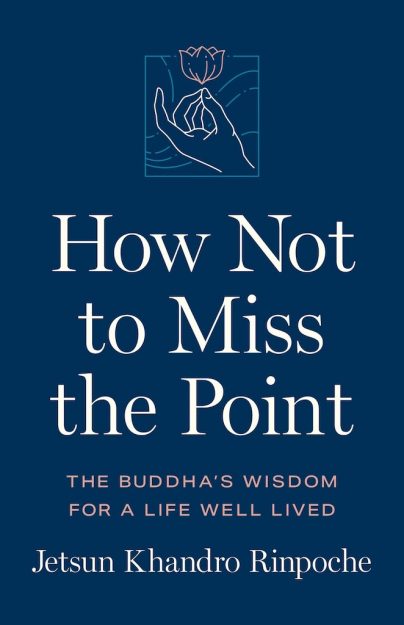3 Basic Laws of Nature That Can’t Be Ignored
A lama in the Kagyu and Nyingma traditions provides a timeless teaching on the relationship between the three characteristics of existence and karma. The post 3 Basic Laws of Nature That Can’t Be Ignored appeared first on Tricycle: The...

A lama in the Kagyu and Nyingma traditions provides a timeless teaching on the relationship between the three characteristics of existence and karma.
By Mindrolling Jetsün Khandro Rinpoche Jun 21, 2025 Photo by Nikolett Emmert
Photo by Nikolett EmmertWe have been swimming against the strong current of natural law. This constant struggle with the truth of things as they are is called karma. This is what the Buddha’s realization allowed him to see. Today the word karma can be found in most dictionaries and is widely used. But what does it really mean? Simply put, it refers to the relationship between actions and their consequences. But this interconnectedness is a very big picture. Just as a small fistful of seeds can ripen into a field of grain, small acts can have far reaching consequences, for better or worse. Moreover, there is individual and collective karma. How can this be? If there is no solid self, we are not just looking at our own lives with their ups and downs or the consequences of our actions and views. We are looking at vast world systems of karmic patterns, which like everything else are impermanent, empty by nature, and interdependent.
Thus, karma has nothing to do with judgment; there is no one above or below keeping track. Karma is simply the wholeness of all these causes and consequences, seeds and fruit. From this perspective, we can see the busyness and speed of karma and how karma can move us away from the truth of things as they are and into habitual struggles with the way they are not. While it would be nice if the struggle were about something brilliant, it is basically about three basic things: the struggle to make what is impermanent permanent, the struggle to turn the interconnectedness of things into separateness, and the struggle to solidify things that by nature are not solid. And so we go on building more houses, creating more relationships, and buying frying pans that are guaranteed to last for twenty years.
When the nuns and I went shopping for a frying pan recently, we were shown a pan made by Le Creuset, a company that makes good pots and pans. This pan has a guarantee of twenty years and a guarantee card to prove it. Now, this is hilarious because the frying pan will probably outlive me. But it was a nice thought and we chose that pan because it was guaranteed. This is how we struggle each day to prove that we can make what is impermanent permanent. This is the struggle to sustain a stubborn belief in independence, disregarding the fact that all things come into being through the interconnectedness of causes and conditions—which are, themselves, not permanent or solid.
Contemplation
Today many of our sangha members are aging. You observe every white hair on your head, every wrinkle, every pain in the knee or the back. But if you go to bed at night fed up and tired, you should ask yourself why you’re so tired and fed up and in so much pain. What have you done to get yourself into this physical and emotional shape? You haven’t done anything remarkable, other than these three things: For the sake of convenience, you have been struggling to make the impermanent permanent. You have been struggling to make things that are interdependent independent. And you have been struggling to solidify things that inherently don’t exist by labeling them with names that you would like everyone else to accept.
And Justifying That
When ego is involved, we are the last ones to admit that our struggle was really unnecessary. To make things worse, we justify the struggle, which is especially painful when there are no takers for our justifications. Add to that six or seven billion people, all insisting on justifying what they think to be permanent, what they think to be right, and what they think to be real—and we’re bound to have disagreements in the world.
Why don’t we just let go? We have immediate justifications for not doing so: “This is not about me; it’s for the children, for posterity, and so on.” We do things like creating practice centers, which get us into lots of issues that we could do without. But the struggle is sustained “to benefit generations to come.” Who knows if it actually will? But this is our justification, like the justifications for buying another car, building another house, starting another relationship, finding another job, or saying something harsh.
There is, even in the midst of our laughter, the subtle discontent consisting of the subtle wish to secure this moment and keep it safe.
Suffering comes with the constant struggle against the three basic laws of nature—impermanence, interdependence, and the empty nature of things—and then having to justify that. The Buddha witnessed this in his own life. His cousin thought, “If I could just kill the prince, I’d be happy.” The king thought, “When my son becomes king, I’ll be happy; if he does not, I’ll be very unhappy.” The Buddha began to see this constant struggle and justification of struggle as the first noble truth: the truth of suffering.
The origin of the Buddha’s concept of suffering was not simply birth, old age, sickness, and death. That kind of suffering—like the suffering of violence, aggression, and other negativities—is easily identifiable. But then there is, even in the midst of our laughter, the subtle discontent consisting of the subtle wish to secure this moment and keep it safe and the fear that this moment will pass, never to come again.
A young couple once came to a retreat madly in love. Throughout the teachings they were whispering back and forth, “Do you love me?” and “You know I love you.” Not long after that, they separated. When I asked the young woman what happened, she said, “He doesn’t love me the way he did before.” This is a good example of trying to make something impermanent into something permanent, by trying to repeat the same thing again and again.
Instead, you could allow things to change and evolve. You could release time from your demands and release others from your control. This is what compassion is about. Compassion releases others from your struggle to make them conform to your wishes. There is a great deal of kindness in giving others the freedom to evolve naturally as they are—and a lot of patience involved in that.
Contemplation
Recognizing that all human beings want to be happy and do not want to suffer, begin by examining these two things: struggle and the justification of struggle. Then you will understand the unnecessary suffering we put most of our energy into, all due to not understanding impermanence, interdependence, and suffering.
♦
From How Not to Miss the Point: The Buddha’s Wisdom for a Life Well Lived by Jetsun Khandro Rinpoche. © 2025 by Dharmashri Group. Reprinted in arrangement with Shambhala Publications, Inc. Boulder, CO
![]()
Thank you for subscribing to Tricycle! As a nonprofit, we depend on readers like you to keep Buddhist teachings and practices widely available.
This article is only for Subscribers!
Subscribe now to read this article and get immediate access to everything else.
Already a subscriber? Log in.

 KickT
KickT 

































